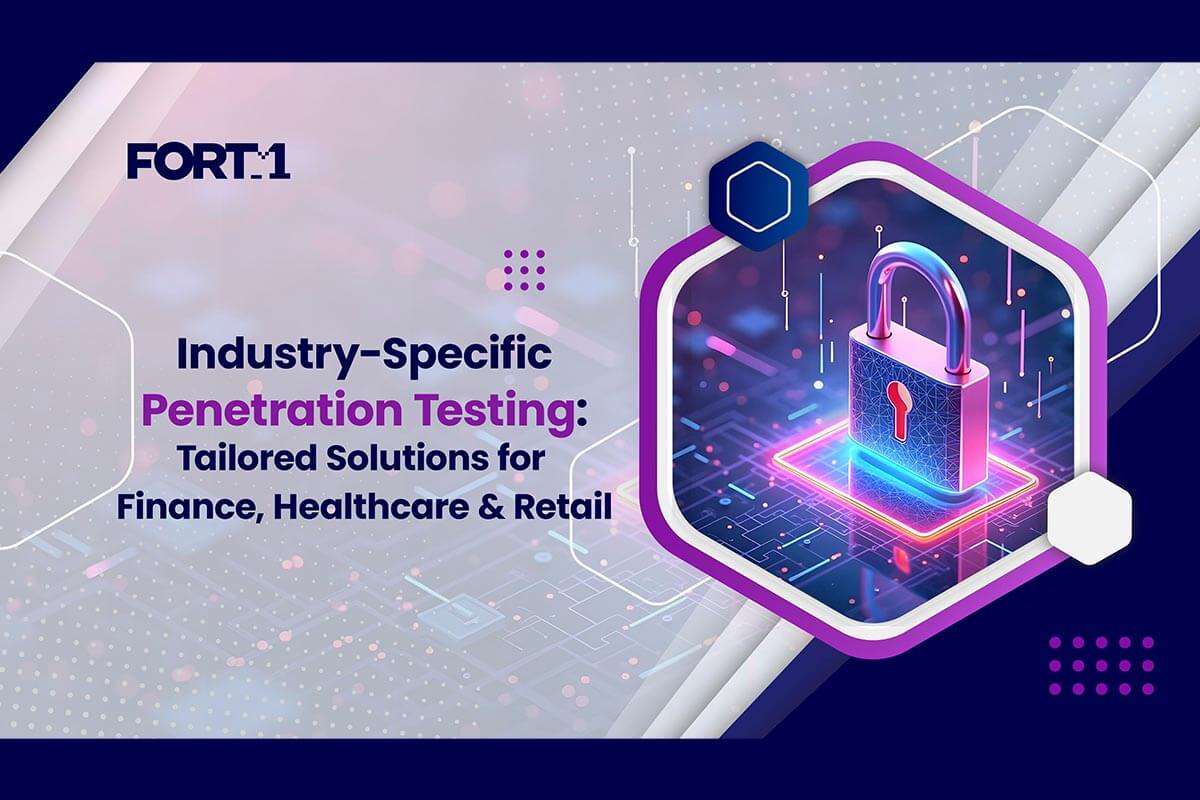




Penetration testing, often referred to as ethical hacking, is a methodical approach to evaluating the security of an organisation’s systems by simulating cyberattacks. This proactive strategy is essential for identifying vulnerabilities before malicious actors exploit them. According to IBM’s Cost of a Data Breach Report 2023, the average cost of a data breach globally reached USD 4.45 million, emphasising the need for robust security measures.
While general penetration testing offers valuable insights, the complexity and specificity of threats vary significantly across industries. For example, the financial sector faces risks from sophisticated phishing schemes and ATM network exploits, while the healthcare industry must safeguard electronic health records and vulnerable IoT devices. The retail sector, on the other hand, often contends with point-of-sale system breaches and supply chain attacks. These industry-specific challenges necessitate tailored security solutions that address unique vulnerabilities and align with sector regulations.
This article explores the importance of customised penetration testing solutions for three key industries: finance, healthcare, and retail. By highlighting their distinct vulnerabilities and optimal testing strategies, we aim to illustrate the critical role that tailored penetration testing plays in fortifying organisational security.
For a comprehensive overview of penetration testing, refer to this authoritative guide.
Industry-specific penetration testing is a focused approach to assessing and mitigating cybersecurity vulnerabilities tailored to the unique risks and requirements of different sectors. Unlike general penetration testing, which applies a broad methodology to uncover system weaknesses, industry-specific testing delves deeper into sector-specific threats, technologies, and compliance obligations.
For instance, while general testing may evaluate application or network security, industry-specific testing considers the operational nuances of a sector. In finance, it might involve scrutinising ATM systems or API integrations; in healthcare, safeguarding patient data or IoT medical devices; and in retail, securing e-commerce platforms and POS systems.
The benefits of this tailored approach are manifold:
Below is a table that highlights the key differences between general and industry-specific penetration testing:
| Aspect | General Penetration Testing | Industry-Specific Penetration Testing |
|---|---|---|
| Scope | Broad analysis across systems | Focused on sector-specific vulnerabilities |
| Customisation | Limited to standard methodologies | Tailored to industry-specific requirements |
| Compliance | Generic compliance checks | Adherence to industry regulations |
| Value | General risk assessment | Targeted risk mitigation for maximum impact |
This precision-driven approach ensures that organisations remain resilient against threats unique to their industries, making it an indispensable component of modern cybersecurity strategies.

The finance sector, due to its handling of sensitive customer information and financial transactions, is a prime target for cybercriminals. Penetration testing in this industry must address the complex vulnerabilities specific to financial institutions and adhere to stringent regulatory frameworks.
Financial organisations in Australia must comply with Payment Card Industry Data Security Standards (PCI DSS) to ensure secure payment environments. Additionally, Australian Prudential Regulation Authority (APRA) guidelines mandate robust cybersecurity measures to protect the integrity of financial systems.
Below is a flowchart illustrating the testing process for financial systems:
This structured approach to penetration testing ensures that financial organisations can address sector-specific risks effectively while maintaining compliance with regulatory standards. By proactively securing their systems, financial institutions can enhance trust and minimise the risk of devastating breaches.
Healthcare organisations face unique cybersecurity challenges due to the sensitive nature of the data they handle and their reliance on interconnected systems. The increased adoption of digital healthcare solutions has amplified the risks, making robust penetration testing a necessity.
Compliance with regulations such as the Health Insurance Portability and Accountability Act (HIPAA) and General Data Protection Regulation (GDPR) is critical to protecting patient data and ensuring organisational accountability.
Below is a diagram illustrating how vulnerabilities in healthcare systems can lead to data breaches:
By addressing these vulnerabilities through tailored penetration testing, healthcare organisations can safeguard sensitive data, protect patient safety, and meet regulatory requirements. Proactive security measures are crucial in preventing breaches that could disrupt patient care or erode trust in the healthcare system.

The retail sector faces a range of cybersecurity challenges, driven by the increasing reliance on digital platforms and payment systems. Penetration testing plays a critical role in identifying vulnerabilities that could expose sensitive customer data, disrupt operations, or undermine trust in the brand.
Retailers must comply with regulations like the General Data Protection Regulation (GDPR) to safeguard customer data and ensure transparency. Additionally, adherence to Payment Card Industry Data Security Standards (PCI DSS) is crucial for processing card payments securely.
Below is a table comparing penetration testing priorities for brick-and-mortar retailers and e-commerce businesses:
| Aspect | Brick-and-Mortar Retailers | E-Commerce Retailers |
|---|---|---|
| Primary Systems | POS devices, in-store networks | Web applications, cloud infrastructure |
| Common Threats | POS malware, insider threats | SQL injection, credential stuffing |
| Testing Focus | Endpoint security, payment card data | Authentication systems, session management |
| Regulatory Focus | PCI DSS compliance | GDPR, PCI DSS compliance |
By leveraging tailored penetration testing strategies, retail organisations can safeguard their operations, protect customer trust, and comply with regulatory requirements. The proactive identification of vulnerabilities is essential for reducing the risks of breaches in this competitive and high-stakes industry.
Adopting tailored penetration testing solutions offers significant advantages, enabling organisations to address unique challenges and elevate their cybersecurity posture. By focusing on sector-specific vulnerabilities, businesses can mitigate risks more effectively, ensure regulatory compliance, and bolster their reputation.
Industry-specific penetration testing helps organisations prioritise and address the most relevant threats. For example, testing in the healthcare industry often focuses on protecting patient data, while retail testing might emphasise safeguarding payment systems. This precision-driven approach minimises the likelihood of costly breaches and operational disruptions.
Compliance with sector-specific standards such as PCI DSS, GDPR, or HIPAA is critical for avoiding penalties and legal repercussions. Tailored penetration testing ensures that an organisation’s security measures meet the stringent requirements of their industry, reducing non-compliance risks.
Cybersecurity breaches can irreparably damage customer confidence. By proactively identifying and addressing vulnerabilities, organisations demonstrate their commitment to protecting sensitive data and maintaining robust security measures. This not only enhances customer trust but also strengthens brand reputation in competitive markets.
Below is a summary infographic highlighting these key benefits across industries:
Tailored penetration testing solutions provide a holistic approach to security, offering long-term value by aligning with industry needs and enhancing operational resilience.
Industry-specific penetration testing is an indispensable tool for safeguarding organisations against evolving cyber threats. By addressing unique vulnerabilities and ensuring alignment with regulatory standards, tailored strategies enable businesses to manage risks effectively and maintain trust. Neglecting industry-specific security needs can lead to devastating breaches, financial losses, and reputational damage.
Fort1 offers customised penetration testing services designed to meet the distinct requirements of industries such as finance, healthcare, and retail. Our expert team ensures your systems are thoroughly assessed and secured. Take the first step towards enhanced cybersecurity by visiting Fort1’s Penetration Testing Services. Secure your business today.

Fort1 provides comprehensive cybersecurity solutions tailored to protect your business from evolving digital threats. With expertise in penetration testing, dark web monitoring, and managed detection services, we empower organisations to stay secure and resilient in the face of modern cyber challenges.
Copyright @2024 Fort1. All Rights Reserved by Fort1.